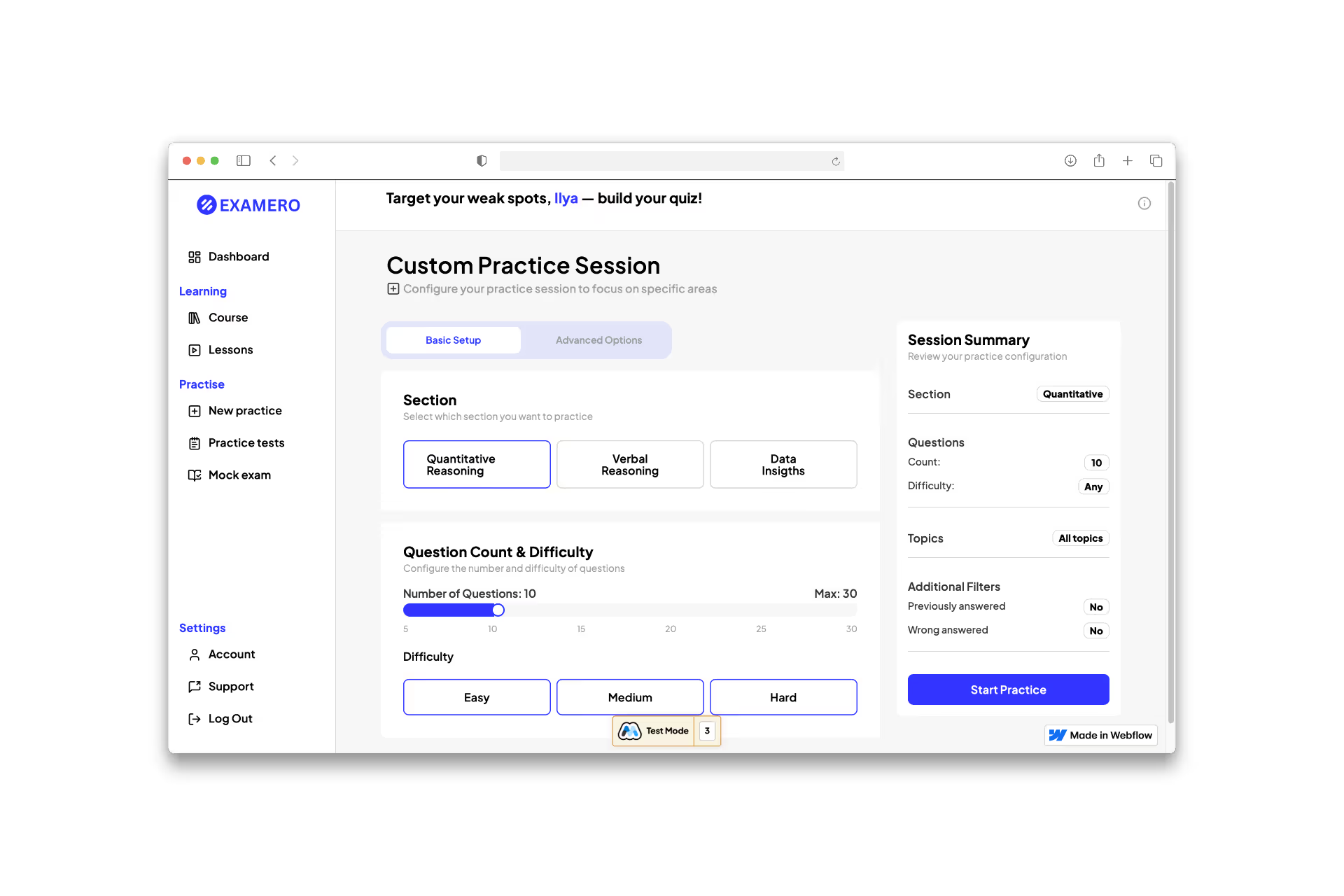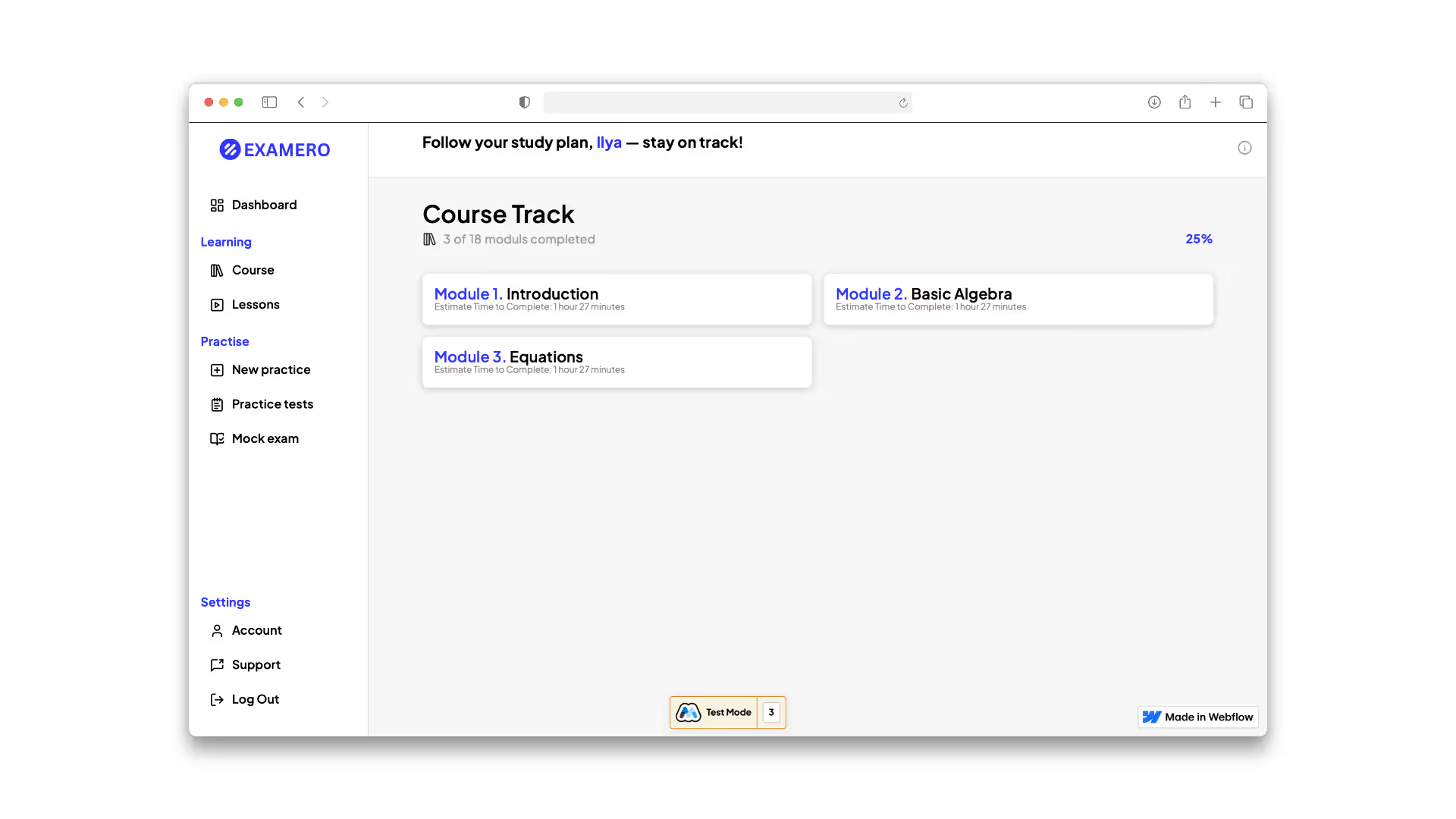Get GMAT-ready with a unlimited full-length mocks, expert lessons, and actionable analytics. A clear path to mastering the Focus Edition and raising your score with confidence.
The advanced preparation platform that ensures your success on exam day.

Study every GMAT section in depth with 40+ hours of structured, expert‑led video lessons tailored to help you reach 700+.

Practice smarter with 1,000+ real‑style GMAT questions covering all sections, each with detailed step‑by‑step solutions.

Simulate the real exam day with unlimited full‑length GMAT mock tests, including scoring analytics and adaptive difficulty.
Our comprehensive GMAT Focus preparation platform provides everything you need to succeed.
Our expertly crafted curriculum covers all GMAT Focus exam topics and question types. Each lesson is designed to build your skills progressively, ensuring you master every concept.




Practice makes perfect. Our platform offers thousands of GMAT Focus-style questions with detailed explanations to help you understand concepts and improve your performance.
Track your progress with our advanced analytics dashboard. Identify your strengths and weaknesses to focus your study time where it matters most.


Choose the course package that best fits your preparation needs and goals.
Still have a question? Contact us via email:
support@examero.com
Make a closer look on Examero platform and take our free GMAT-like mini test and find out where you stand. Quickly assess your strengths and weaknesses and see which areas need the most attention.
Take the test nowStart your preparation with confidence. Find answers to all key questions about the GMAT.
Most candidates spend between 2 to 4 months preparing for the GMAT. This typically includes 100–150 hours of study, depending on your familiarity with the content, target score, and test-taking strategies. Those aiming for a 700+ score often require more structured prep, including full-length practice tests and review sessions.
The GMAT Focus Edition is a redesigned version of the GMAT introduced in 2023. It is shorter (2 hours 15 minutes vs. 3 hours 7 minutes), does not include the AWA section, and has a different structure with three sections: Quantitative Reasoning, Verbal Reasoning, and the new Data Insights section. The Focus Edition emphasizes integrated reasoning and real-world data interpretation more than the classic GMAT.
The GMAT is generally considered more structured and predictable, while the CAT (Common Admission Test) is known for its difficulty and surprise elements. GMAT includes a wider range of verbal topics, while CAT is heavier on quantitative aptitude and data interpretation. If you're targeting global B-schools, GMAT is preferred; for Indian IIMs, CAT is standard.
It varies per person, but most successful candidates dedicate 100–150 total study hours. This includes content review, solving official questions, timed practice tests, and reviewing mistakes. Spreading this over 8–12 weeks (10–15 hours/week) is common.
Absolutely. Online GMAT preparation has become the most popular mode due to its flexibility, access to quality content, adaptive platforms, and personalized mentoring. Many top scorers prepare fully online using prep courses, private tutors, and forums like GMAT Club or Reddit.
Both GMAT and GRE are accepted by most MBA programs. However, the GMAT is specifically designed for business school applicants and may carry more weight at certain programs. If you’re applying to dual-degree programs or want to keep options open beyond business school, the GRE might be more versatile.
Yes, scoring 700+ in 3 months is achievable with a focused and consistent study plan. It usually requires studying at least 10–15 hours per week, working on your weak areas, using official GMAT prep materials, and taking adaptive practice tests regularly.
Yes, a 720 places you in the 94th percentile globally. It’s considered a top-tier score and significantly boosts your chances of admission to elite MBA programs like Harvard, Stanford, Wharton, INSEAD, and LBS. However, other parts of your profile like work experience and essays still play a key role.
Yes, many top Indian B-schools accept the GMAT, especially for executive or global MBA programs. For example, IIM Ahmedabad’s PGPX, IIM Bangalore’s EPGP, and ISB Hyderabad accept the GMAT. However, for flagship 2-year MBA programs at IIMs, the CAT is typically required.
No, the GMAT is widely used not just for MBA admissions, but also for other business-related graduate degrees such as Master in Finance, Master in Management (MiM), and dual degree programs like JD/MBA. Many top global universities consider the GMAT a key criterion for evaluating academic and analytical ability.
Top 10 global B-schools usually have average GMAT scores in the 710–740 range. For example, Stanford GSB’s median GMAT is 738, Harvard’s is 730, and INSEAD’s is around 710. However, a slightly lower score can still be competitive if the rest of your profile is strong.
You can take the GMAT up to 5 times in a 12-month period, and up to 8 times in your lifetime. You must wait at least 16 days between attempts. Most schools will see all your scores from the last five years, but usually consider your highest score during evaluation.


